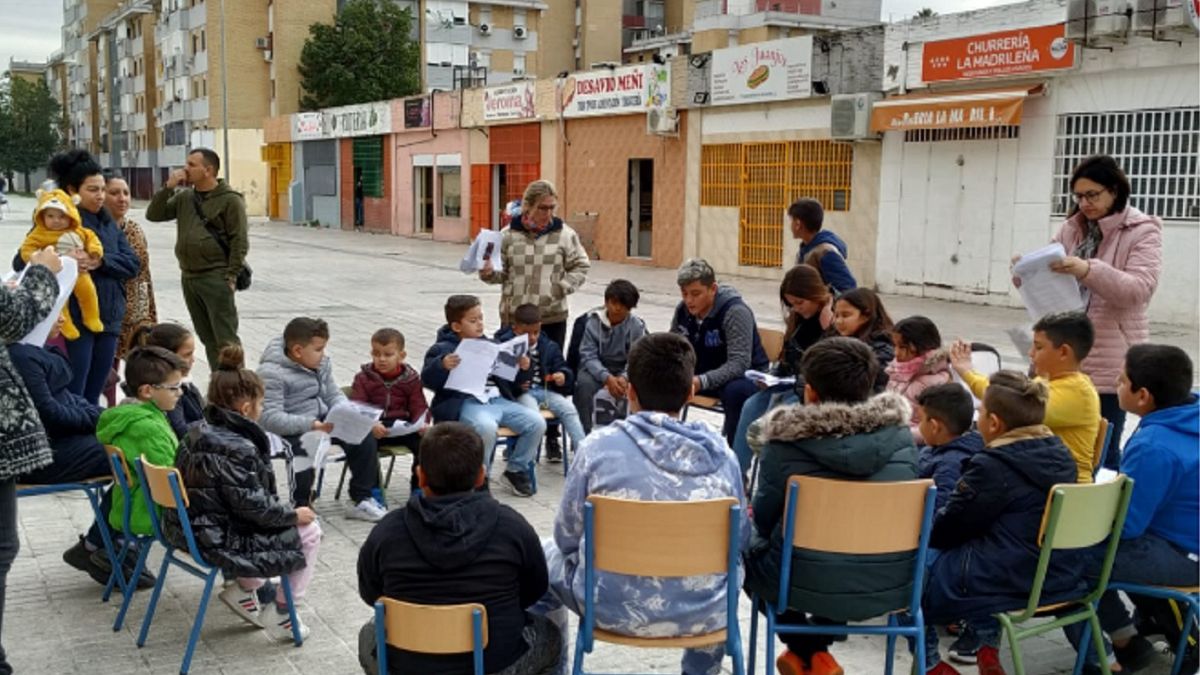A neighbourhood in Spain where the average salary is a fraction of the national one, unemployment is double the country's rate and school absenteeism runs rampant is showing the way on how to boost literacy among children.
Taxi drivers are reluctant to enter Los Tres Mil Viviendas, such is the notoriety of Spain’s poorest neighbourhood.
These crumbling tower blocks in Seville are plagued by drug gangs and the electricity is regularly cut off to close the dealers’ marijuana plantations.
However, despite its reputation as the most impoverished and dangerous place in the capital of Spain's southern region of Andalusia, Los Tres Mil Viviendas has now one positive boast.
The Fantasy Library, a name chosen by the children, is a library within a primary school which won a national prize for inspiring disadvantaged pupils to read.
The Spanish government’s National Prize for Development of Reading, which carries an award of €30,000, was granted for encouraging children – and their parents - to enjoy the works of Oscar Wilde, Homer’s The Odyssey or Don Quixote, the masterpiece by Miguel de Cervantes.
It comes as the European Commission has an inclusion project called Pathways to School Success, which aims to ensure all learners achieve their full potential regardless of their social background.
Normalising reading
At the Fantasy Library, children take books home and make reading a normal part of their lives along with their parents.
In some cases, mothers and fathers do not know how to read so the library helps them learn this vital life skill.
However, the achievement is all the greater because of the setting of the Public College of Andalucia.
Last year, average annual earnings for the inhabitants of Los Tres Mil Viviendas were €5,600, according to the Spanish National Statistics Institute. In comparison, the Spanish average national annual earnings are €28,660.
Absenteeism from school in the area runs at over 70%, authorities say, as priorities like finding work or the temptation of crime take children away from the classroom. Unemployment stood at around 25%, more than double the national rate.
“Given that we are in an area with lots of needs, encouraging people to make reading part of their lives is much more difficult. There is a high degree of unemployment,” Natalia Aronja, the librarian, told Euronews.
“The children take the books home and are normalising the habit of reading among their families. We also have discussion groups about classic books which are attended by children and parents alike.”
Another side of Los Tres Mil Viviendas
After 16 years of hard, but dedicated, work by the teachers since the library opened, the message has finally got across, she said.
Children at the school, which has 120 pupils aged three to 12, spend an hour per week in the library with their teacher. They are taught how to use a library when they leave school and can make use of similar amenities.
Play times at the school can also be dedicated to reading.
“There are some pupils who prefer reading to football or basketball. It is very organised so that it is not the same children who are playing football or other sports. There is a rotation. And so those who are not playing can spend time reading,” Ms Aronja said.
She paid tribute to the teachers whose “love for teaching” had made the achievement possible.
“The children take books home to read because they like to,” she added.
Angela Molina, the director of the school, said the library represented the “other side” of a neighbourhood which suffers from what she said were the “cliches” about Los Tres Mil Viviendas.
“Our children like to read and their families are interested in their education,” she told Europa Press news agency.
Extending schools' opening hours and remit
The European Commission’s School for Success project consists of programmes across the continent designed to help disadvantaged children make the best of their circumstances. It is part of the institution's European Education Area 2025 policy.
In Italy, the Scuola Viva programme aimed at improving the quality of schools in the Campania region. This involved keeping schools open after they would normally close and offering a range of cultural, social, artistic and sporting activities. It was carried out in 500 educational institutions.
In Sweden, the Berättarministeriet - or Storytelling Ministry – is a private initiative helping teachers and pupils in socio-economically challenged areas to develop language through storytelling.
The programme runs training centres in Husby and Hagasätra in Stockholm and Gamelstaden in Gothenburg.
Primary schools in these areas are offered free school programmes that allow pupils to enjoy learning through storytelling, regardless of their level of knowledge.
The programmes are developed to meet specific pedagogical needs in coordination with the teachers at these schools.
